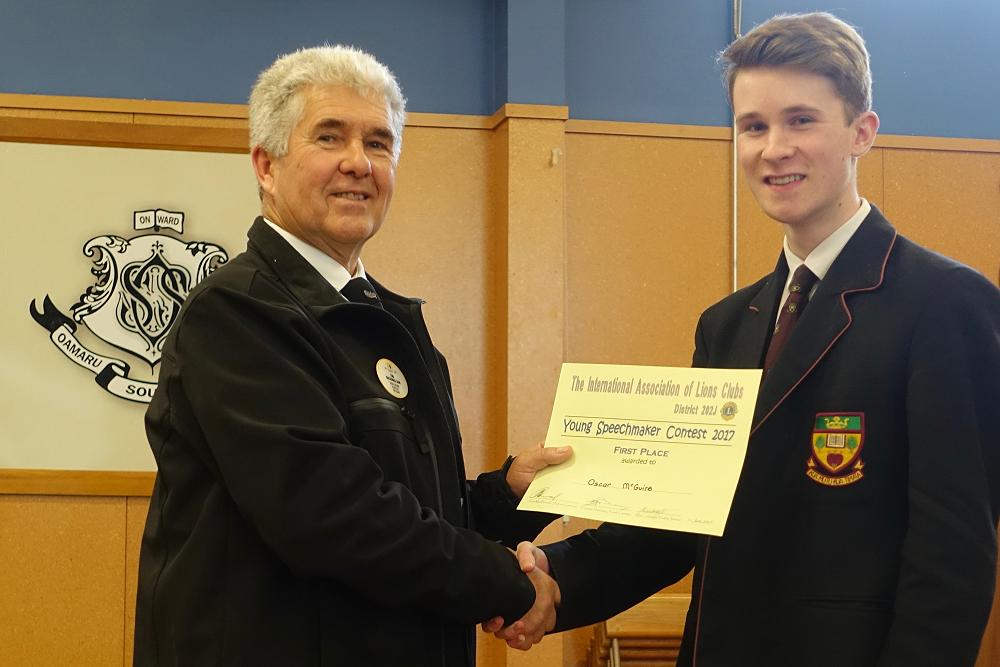
Otago-Southland Lion's Speech Winner
Oscar McGuire won the Otago-Southland regional final of the Lions Speech competition in June.
The competition is open to those aged 17-21 and a university of Otago student, Joseph Corbett was placed second. Both went on to the nationals in Wellington in August.
Oscar was sponsored by the Port Chalmers and District Lions Club, and his prepared speech was on Fake News.
His impromptu topic was whether NZ should have a military or not. Contestants had one minute to prepare.
His speech transcript appears below:
Fake News
Oscar McGuire
New Zealand Lions Young Speechmaker Contest, 11 June 2017
DC Gazette. Empire Sports. Conservative Frontline. Denver Guardian. They may sound like legitimate publications. They may look like legitimate publications. But these sites have one thing in common - they all publish verifiably false stories. Last year, I was one of many million to follow the US presidential election. I looked on, at first, amused, and then concerned, as I saw some absurd, false stories gain traction. If I was to believe some of the articles I was seeing and hearing about, I would have been living in a very different world. One where Hillary Clinton sold weapons to ISIS. One where Obama banned the Pledge of Allegiance in schools nationwide. It’s easy to write these off as crazy, incredibly niche conspiracy theories. But that ignores the simple fact that millions of people interact with these articles. The article claiming Obama banned the pledge of allegiance, published by the fraudulent site abc.news.com.co, had over 2.2 million interactions on Facebook. In a political climate rife with Orwellian ‘alternative facts’, the difficult process of democracy has been hijacked. President Trump continues to denigrate and undermine faith in traditional news media while the real fake news successfully infiltrates our Facebook feeds and political discourse worldwide.
Propaganda is nothing new. In fact, examples can be found as far back as 515 B.C, in an inscription which depicts King Darius rising to the Persian throne. However, modern fake news doesn’t take the form of inscriptions. Modern fake news isn’t found in posters, or recruitment videos, either. Instead, it harnesses the power of the internet — and I’m willing to bet King Darius didn’t have a Facebook account. The internet, and its ability to democratise access to information, has played a large part in enabling independent writers and journalists. However, with near zero cost involved to create a functional website, and the ability to reach a large number of people quickly, the internet has also served as an incredible facilitator of fake news and misinformation.
A study on fake news in the American election, published by Stanford University, noted that Facebook and other social media platforms allow content to be ‘relayed among users with no significant third party filtering, fact-checking, or editorial judgment,’ and that ‘an individual user with no track record or reputation can in some cases reach as many readers as Fox News, CNN, or The New York Times.’ This can lead to real consequences. In one incident, a man in Washington fired a rifle in a pizza restaurant, after reading a fake news story, now dubbed ‘Pizzagate’, that ridiculously claimed the store was operating a human trafficking ring in the basement, supposedly run by Democratic Party officials. Furthermore, Facebook algorithms are designed with ad revenue in mind, and therefore show you what you want to see, and the same applies to news. This allows fake news to play to political, especially conservative, biases. Combine this with the tendency for Facebook users to cultivate echo chambers, and this makes it incredibly hard to maintain a balanced opinion of current events. This can be seen in the Wall Street Journal’s ‘red feed, blue feed’ experiment, which simulated the Facebook news feeds of conservative and liberal users. The result is staggering, with the two news feeds, despite covering the same stories, appearing completely different, and pushing totally separate narratives. How can democracy be expected to function if voters are disagreeing on the most basic of facts?
We clearly need to be mindful of fake news, especially heading into the New Zealand general election. Fake news is not limited to the United States, and reports of fake news websites targeted at New Zealanders, such as the fraudulent sites christchurchnews.co.tk, or aucklandnews.co.tk, have surfaced. These sites have pushed false stories about mosque attacks in Auckland, the Kaikoura quakes, and more, with some stories already attracting as many as 130,000 views. So what can we do about it? The best way to fight fake news is to rigorously fact check. Sites such as Politifact actively debunk fake news stories, and should be used on a regular basis, especially when an article appears dubious. Oxford Dictionary’s 2016 word of the year was ‘post-truth’, and it’s not hard to see why. For the health of our democracy, and to keep quality journalism alive, it’s imperative that we combat fake news. I urge you - fact check. Report fake Facebook articles. Get news from multiple sources. Fake news can only succeed if we’re complacent and ill informed. Let’s prove we’re not.